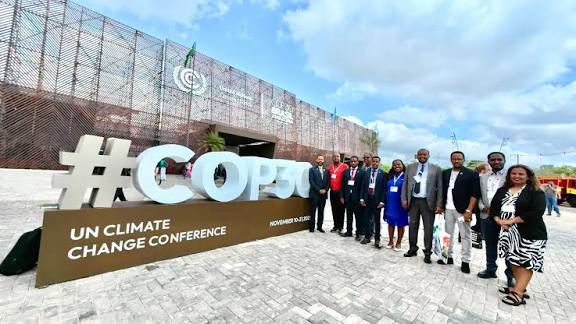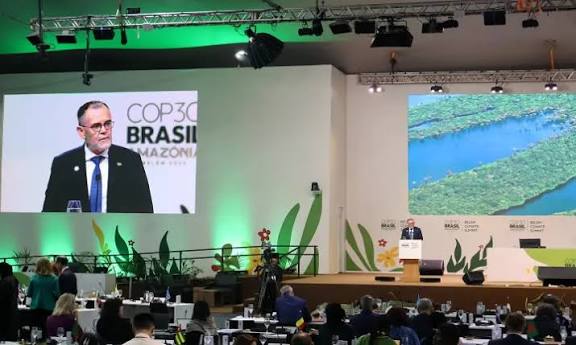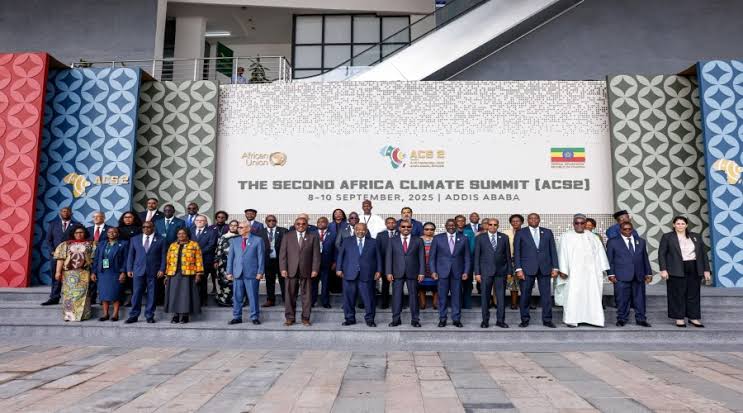Ethiopia Set to Host the United Nations Climate Summit (COP32), Edging Out Nigeria.

Ethiopia on Tuesday, announced that it would be hosting the United Nations' COP 32 climate Summit in 2027, edging past Nigeria to become Africa's selected pick for 2027.
The announcement was made during the ongoing COP30 conference in Belem, Brazil. The Conference featured a call to world leaders and delegates to confront rising global temperatures and push for urgent, coordinated climate action.
The conference also focuses on enhancing emissions reduction and climate resilience, while promoting an inclusive and equitable transition.
Richard Muyungi, chair of the Africa Group of Negotiators told AFP the group "has endorsed Ethiopia." The Brazilian presidency of COP30 confirmed the African countries' choice to French press agency AFP.
However he noted that "It's not yet official -- the decision still needs to be officially adopted by all participating nations during the conference, which ends on November 21 -- but that should be a formality."

While this selection awaits official ratification, it signals a significant moment for Africa's Leadership in the fight against climate change.
WHY ETHIOPIA?
Ethiopia's selection to host the COP 32 over Nigeria reflects a combination of strategic, diplomatic, and logistical advantage, Ethiopia possesses in comparison to it's counterpart.
As the headquarters for the African Union, Addis Ababa is no stranger to hosting gatherings of this nature as it has an extensive record hosting high-profile regional and international events and it's no surprise they were favoured over Nigeria.
Ethiopian Ambassador to Brazil, Leulseged Tadese Abebe, confirmed that preparations for COP 32 have already begun. He said "We look forward to welcoming all of you to Addis Ababa for COP32."
THE UNITED NATIONS CLIMATE CHANGE CONFERENCE
The United Nations Climate Summits are organised yearly in rotation among the five regional blocs — Africa, Asia-Pacific, Latin America and the Carribbean, Eastern Europe, and Western Europe and Others. This blocs must however choose who will host it when it gets to their turn.
This arrangement has been known to cause certain power struggles over the years.
This happens because the host country, and by extension it's region is at the forefront of the conference. They not only welcome and host world leaders and negotiators but also help shape the agenda, set discussion priorities, and steer negotiations. This gives the host country the ability to push for solutions to the climate issues that bother them.
ETHIOPIA'S CLIMATE CREDENTIALS AND AFRICA'S BROADER CLIMATE AGENDA
Ethiopia brings strong climate credentials to its role as host of COP32. Over the years, Ethiopia has demonstrated huge commitment and determination to Climate issues. Through initiatives like the Green Legacy, which saw billions of trees get planted to combat deforestation and land degradation, Ethiopia has reinforced it's position as one of Africa's leading climate protectors.
In partnership with other African nations, Ethiopia stood at the forefront of the Great Green Wall Initiative working to restore degraded lands and halt the southward advance of the Sahara desert.
Ethiopia has also committed to achieving carbon neutrality by 2030, while expanding renewable energy infrastructure, like hydropower and solar projects to meet the growing energy needs.
Ethiopia also hosted the African Climate Summit in September.

Hosting the United Nations Climate Summit (COP 32) presents Africa with a very unique opportunity — the ability to prioritise Africa's climate issues which have long been ignored. African nations face some of the harshest impacts of climate change despite contributing the least to global emissions.
By leading the conversations in the summit, Ethiopia on behalf of it's continent can bring this issues among others to the forefront of global negotiations. By doing this and getting maximum support from other African nations and maybe nations from other regions, stronger commitments to solving these problems can renewed. Initiatives like climate-smart agriculture to large-scale reforestation programs can be brought up, agreed upon and implemented.
CHALLENGES, EXPECTATIONS, AND THE WAY FORWARD
While Ethiopia's hosting of the UN Climate Summit (COP 32) represents a unique opportunity: it does come with concerning challenges. Organising a global submit of this nature requires robust infrastructure, security, logistics and coordination throughout the length of the summit.
Addis Ababa must be well prepared to accommodate thousands of delegates and guests, while ensuring that they are secure and everything runs smoothly from start to the end of the conference.
Political stability is also something to consider. Ethiopia is currently facing certain internal issues in it's Tigray region and other parts of the country. Ensuring that these issues do not affect preparations for the conference and the conference itself will determine be critical to maintaining the credibility of Ethiopia and Africa — as any slight escalation can result in Ethiopia and Africa forfeiting opportunities to host the conference in the nearby future.
Addis Ababa also needs to ensure that bureaucratic inefficiencies do not delay the planning of the conference. They also need to ensure that every financial move towards the planning of the summit is as transparent as possible.
Beyond this challenges, there are expectations from the African Community on Ethiopia. African nations, historically marginalised, will be expecting Ethiopia to amplify their voice in this conference and ensure their problems are not only discussed, but commitment towards tackling this issues are established and renewed.
If executed effectively, COP 32 could transform Africa's role in global climate diplomacy, turning a symbolic opportunity into a historic platform for measurable, continent-wide climate impact.
COP 31 DEADLOCK
While COP 32 seems to be settled as regards hosting, next year's edition — COP 31 seems to have hit a brick wall. Next year's conference is to be hosted by the Western Europe and others region, but the choice hasn't been made yet because of two opposing bids to host the conference.
Australia made its COP31 bid in partnership with the Pacific Islands, which are among the world's most vulnerable places to climate change and proposes to host it in Adelaide, Turkey on the other hand has refused to concede and abandon its bid for Antalya.
To break the deadlock, negotiations are currently ongoing to avoid the decision been taken away from them — if they're unable to provide a host by the end of the COP 30, the conference will be held by default at the UN Climate Change headquarters in Bonn, Germany.
Such a deadlock would be unprecedented in the history of UN climate conferences.
Ultimately, Ethiopia's selection for COP 32 marks a historic opportunity for Africa to lead global climate discussions and push for concrete action.
Recommended Articles
African Development Soars: Eswatini Hails Ethiopia's Ambitious Mega Projects

The Kingdom of Eswatini has lauded Ethiopia's significant strides in large-scale development projects, particularly high...
Ethiopia-Eritrea Tensions Escalate: Addis Ababa Demands Immediate Troop Withdrawal

Ethiopia demands Eritrean troops leave its territory amid rising border tensions. Historical conflicts, the Tigray war...
Trump Reignites GERD Debate With New Mediation Offer

Former US President Donald Trump has offered to restart mediation efforts between Egypt and Ethiopia over the Grand Ethi...
Travel Revolution: Ethiopia and India Forge Diplomatic Visa-Free Pact

Ethiopia and India have formally implemented a mutual visa waiver agreement for diplomatic passport holders, effective i...
Kenya's Cross Country Dream: Can Tirop Secure Historic Tenth Title?

Kenya fields a strong senior women's team at the World Athletics Cross Country Championships in Tallahassee, aiming for ...
Ethiopia's Gambella Plunges into Turmoil Amid Hunger and Refugee Influx

A humanitarian crisis is intensifying in Ethiopia's Gambella region, fueled by escalating ethnic violence, deteriorating...
You may also like...
Super Eagles Fury! Coach Eric Chelle Slammed Over Shocking $130K Salary Demand!
)
Super Eagles head coach Eric Chelle's demands for a $130,000 monthly salary and extensive benefits have ignited a major ...
Premier League Immortal! James Milner Shatters Appearance Record, Klopp Hails Legend!

Football icon James Milner has surpassed Gareth Barry's Premier League appearance record, making his 654th outing at age...
Starfleet Shockwave: Fans Missed Key Detail in 'Deep Space Nine' Icon's 'Starfleet Academy' Return!

Starfleet Academy's latest episode features the long-awaited return of Jake Sisko, honoring his legendary father, Captai...
Rhaenyra's Destiny: 'House of the Dragon' Hints at Shocking Game of Thrones Finale Twist!

The 'House of the Dragon' Season 3 teaser hints at a dark path for Rhaenyra, suggesting she may descend into madness. He...
Amidah Lateef Unveils Shocking Truth About Nigerian University Hostel Crisis!

Many university students are forced to live off-campus due to limited hostel spaces, facing daily commutes, financial bu...
African Development Soars: Eswatini Hails Ethiopia's Ambitious Mega Projects

The Kingdom of Eswatini has lauded Ethiopia's significant strides in large-scale development projects, particularly high...
West African Tensions Mount: Ghana Drags Togo to Arbitration Over Maritime Borders

Ghana has initiated international arbitration under UNCLOS to settle its long-standing maritime boundary dispute with To...
Indian AI Arena Ignites: Sarvam Unleashes Indus AI Chat App in Fierce Market Battle

Sarvam, an Indian AI startup, has launched its Indus chat app, powered by its 105-billion-parameter large language model...
